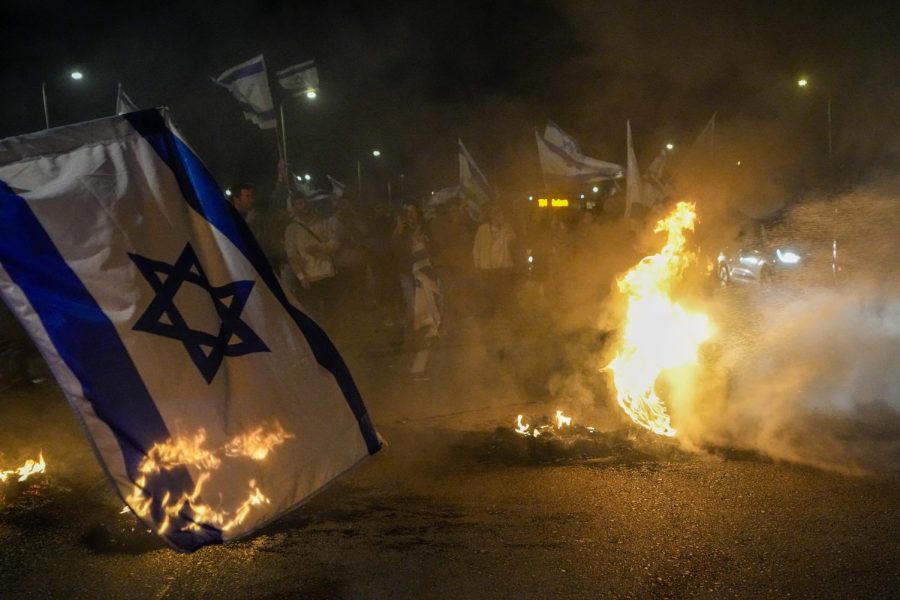Protests and controversy erupts in Israel over Netanyahu’s judicial plans
Anti-government protestors burn tires near Beit Yanai, Israel, Monday, March 27, 2023. Tens of thousands Israelis protest against Prime Minister Benjamin Netanyahu’s judicial overhaul plan.
Mar 31, 2023
Over the last week, people all across the nation of Israel, particularly in the former capital of Tel Aviv, have taken to the streets to protest the proposed judicial override legislation by Prime Minister Benjamin Netanyahu.
Netanyahu’s plan would allow the Knesset, Israel’s parliament, to override any decision made by the Israeli Supreme Court. The plan, originally formulated by the libertarian U.S.-backed think tank The Kohelet Policy Forum, has proven to be extremely controversial within the Israeli political sphere. Many key individuals, like President Isaac Herzog, Economy Minister Nir Barkat and former Prime Minister Yair Lapid have all criticized the move, calling for Netanyahu to back down.
Within Netanyahu’s right-wing Likud Party, reception has been overall mixed. Some members, like the aforementioned Barkat, have pushed back against the legislation and have voiced their opposition. It got to the point where Netanyahu fired his defense minister, Yoav Gallant, after he called for a halt to the legislation.
Some, however, have been equally vocal in their support. Notably, National Security Minister Itamar Ben-Gvir threatened to resign if Netanyahu withdrew his plans for judicial override. Ben-Gvir, whose far-right Otzma Yehudit Party is part of Netanyahu’s coalition, has long been a controversial figure in Israeli politics for his extremist views (e.g. associating himself with a rabbi who called for stripping Arab Israelis of their citizenship and hanging a picture of a man who murdered 29 Palestineans in his home) to the point where he was denied entry into the IDF over his beliefs.
On March 27, it was announced that Netanyahu would delay his plans for judicial override indefinitely. This was supported by Ben-Gvir who announced that, in return for his support, Ben-Gvir’s plan for an Israeli National Guard would begin developing. However, many within the Israeli security community decried this agreement, with Israeli Police Chief Moshe Karadi arguing that Ben-Gvir would be forming “a private militia for his own political needs.”
A spokeswoman for the U.S. National Security Council released a statement on this series of events, remarking, “We continue to strongly urge Israeli leaders to find a compromise as soon as possible. We believe that is the best path forward for Israel and all of its citizens,” ending with, “U.S. support for Israel’s security and democracy remains ironclad.”
Mindy Peden, an associate professor of political science at John Carroll who has visited Israel and studied Israeli political dynamics, commented on the uniqueness of the current turmoil. “It’s unprecedented in terms of Israelis protesting the government.
“Israel doesn’t have a constitution which, from an American perspective, is hard to understand because so much of our legal system is based on that…at least one major interpretation of why Netanyahu wants to change the judiciary is to consolidate power.”
When asked how the U.S. can possibly weigh in on the situation, Peden replied, “My guess would be that to the extent the US relationship with Israel is guided by American interests there, meaning lots of different things, but also specifically Jewish people in America. Their thoughts on what democracy looks like should probably be very influential here.”













